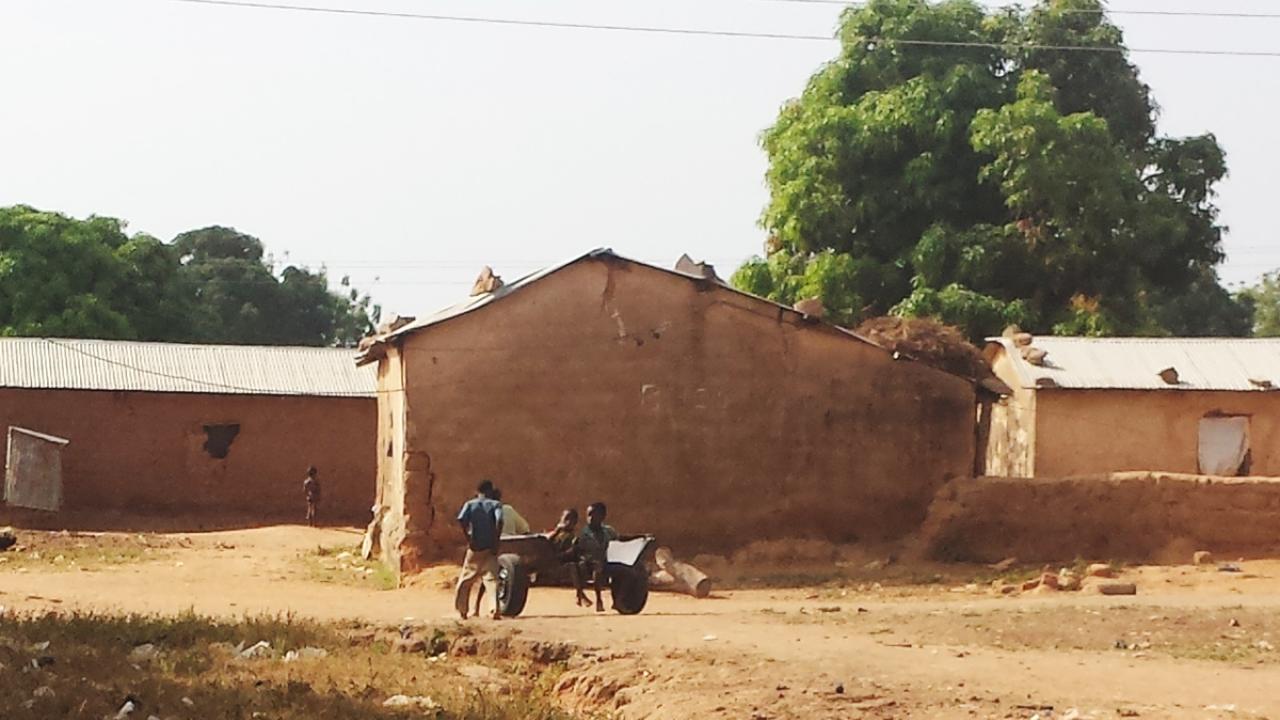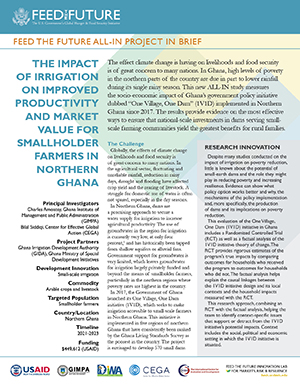
The effect climate change is having on livelihoods and food security is of great concern to many nations. In Ghana, high levels of poverty in the northern parts of the country are due in part to lower rainfall during its single rainy season. This new ALL-IN study measures the socio-economic impact of Ghana’s government policy initiative dubbed “One Village, One Dam” (1V1D) implemented in Northern Ghana since 2017. The results provide evidence on the most effective ways to ensure that national-scale investments in dams serving small-scale farming communities yield the greatest benefits for rural families.
Project Overview
Principal Investigators: Charles Amoatey, Ghana Institute of Management and Public Administration (GIMPA)
Bilal Siddiqi, Center for Effective Global Action (CEGA)
Project Partners: Ghana Irrigation Development Authority (GIDA), Ghana Ministry of Special Development Initiatives
Development Innovation: Small-scale irrigation
Commodity: Arable crops and livestock
Targeted Population: Smallholder farmers
Country/Location: Northern Ghana
Timeline: 2021-2024
Funding: $423,142 (USAID)
The Challenge
Globally, the effects of climate change on livelihoods and food security is of great concern to many nations. In the agricultural sector, fluctuating and unreliable rainfall, reduction in rainy days, drought and flooding have affected crop yield and the rearing of livestock. A struggle for domestic use of water is often not spared, especially in the dry seasons.
In Northern Ghana, dams are a promising approach to secure a water supply for irrigation to increase agricultural productivity. The use of groundwater in the region for irrigation is currently very low, at only four percent,1 and has historically been tapped from shallow aquifers or alluvial fans. Government support for groundwater is very limited, which leaves groundwater for irrigation largely privately funded and beyond the means of smallholder farmers, particularly in the northern regions where poverty rates are highest in the country.
In 2017, the Government of Ghana launched its One Village, One Dam initiative (1V1D), which seeks to make irrigation accessible to small-scale farmers in Northern Ghana. This initiative is implemented in five regions of northern Ghana that have consistently been ranked by the Ghana Living Standards Survey as the poorest in the country. The project is envisaged to develop 570 small dams in various communities to support dry-season gardening and livestock rearing leading to enhanced food security, incomes and people’s wellbeing.

Research Design
An ALL-IN research team led from the Ghana Institute of Management and Public Administration (GIMPA) is collaborating with the Ministry of Special Development Initiative and the Ghana Irrigation Development Authority (GIDA) to evaluate the 1V1D initiative and its impacts. The study uses a mixed-methods research approach that assesses 1V1D’s design and community contexts as well as a randomized controlled trial (RCT) to measure its actual impacts on rural families.
The evaluation of 1V1D includes interviews, focus group discussions and detailed documentary analysis on the theory of change. These establish the mechanisms and contexts that may determine the program’s impacts in rural communities.
The RCT selects similar households into two treatment groups and a control group to compare outcomes that include crop yields, livestock production, income and food security. Households in the control group live in communities that did not receive a dam, providing a comparison for households in communities that did. The three groups are:
- T1: Communities receive a dam, households receive no additional training
- T2: Communities receive a dam, households receive field-based trainings that include efficient use of irrigation, appropriate farming practices, livestock rearing and marketing of farm produce.
- Control: Communities do not receive a dam and households receive no training
The research team is selecting households from 60 villages receiving the 1V1D initiative and another 60 from villages not receiving it for a total of 600 households across the T1 and T2 groups to compare with 600 households in the control group. Surveys with farmers take place after the dry/irrigation season ends.
Development Impact
This study builds evidence for selecting, designing and implementing policy to support small-scale farmers in Ghana. It aligns with Feed the Future and USAID efforts in Ghana with its focus on the northern region and on increasing productivity in arable crops and livestock as a means to reduce poverty and promote improved nutrition.
The Government of Ghana is not only interested in knowing the effects of the 1V1D initiative on target groups but also the mechanisms behind how and why the policies work or fail for possible scale-up or cancellation. Since 2017, the Government of Ghana has focused on 33 priority projects guided by the National Policy Plan and 17 flagship programs. The Ghana Ministry of Monitoring and Evaluation, which assumes an oversight responsibility on the implementation of 1V1D, has developed a results framework to guide their delivery. The Ministry also undertakes a rapid assessment of the programs to guide cabinet decisions.
GIMPA has supported the Ministry in its oversight role since 2017, including the development of the National M&E Policy and the development of the Results Framework. This 1V1D evaluation expands this collaboration to include the Ministry of Special Development Initiatives which directly oversees the delivery of 1V1D. With the support of the Minister of M&E, evidence from this study will improve the delivery of 1V1D and many other government flagship programs.
[1] Martin N. 2006. “Development of a water balance for the Atankwidi catchment, West Africa – a case study of groundwater recharge in a semi-arid climate.” Ecology and Development Series, No. 41.
This report is made possible by the generous support of the American people through the United States Agency for International Development (USAID) cooperative agreement 7200AA19LE00004. The contents are the responsibility of the Feed the Future Innovation Lab for Markets, Risk and Resilience and do not necessarily reflect the views of USAID or the United States Government.
